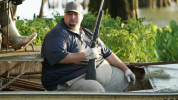-
Please take a moment and update your account profile. If you have an updated account profile with basic information on why you are on Air Warriors it will help other people respond to your posts. How do you update your profile you ask?
Go here:
Edit Account Details and Profile
You are using an out of date browser. It may not display this or other websites correctly.
You should upgrade or use an alternative browser.
You should upgrade or use an alternative browser.
Active shooter at NAS Pensacola
- Thread starter Waveoff
- Start date
Im Jewish.

Happy Kwanzaa.
I couldn't LIKE this more.If an aircraft was capable of being manufactured with an ejection seat but wasn’t procured with one, and the explanation was because “Aviators will forget to seat their pins and it may get them killed, So in order to prevent that we will just not install the ejection seat because it’s unlikely he’ll need to use it anyway.”
That’s how stupid your logic sounds right now.
OMG!!! What if someone came to work armed everyday for years and no one ever knew it? A stroke of a pen could ensure that was not a punishable offense. Negligent discharge, brandishing, openly displaying, or other unauthorized use of that weapon would still be a punishable offense. How %^&*^% hard would that be?
Other than a 15 minute how-to on pulling the pew pew switch on an M4, I've had zero official military training on firearms. Once a year I have to prove I can hit pop-up targets with both an M4 and an M9, but no one showed me how to do that. If you need help, there are good shooters who can help you out and give you pointers. "Here. Here's your weapons and ammo. Figure out how you want to carry it in your aircraft and on your person. Turn it in at the end of deployment clean. We won't count your ammo. But you will have to go through a metal detector before leaving to go home."
There you go. That's the training that you get. This has resulted in ZERO negligent discharges or other events in Florida Guard Aviation in the 12 years I have been in.
This has resulted in ZERO negligent discharges or other events in Florida Guard Aviation in the 12 years I have been in.
Sure....but how has that worked out in the Louisiana Guard?

OK, I'm being a jerk. @RobLyman is absolutely correct. Training is simply reinforcement of logic already taught. Firearms basics should be taught at basic/OCS and carried through two or three times a year depending on your job and what you carry. The expense would not be that high and the security would be a worthwhile benefit. Ever since I joined the Corps about 500 years ago there has been a struggle between the "zero-defect" mentality of safety and the inherent dangers of the job. Give up on the zero-defect part....the job is too dangerous and people will be people.
Im Jewish.


First, I love it! I have friends in the LA guard. They would love it too! Nice 10-22 for shootin' squirrels and such.Sure....but how has that worked out in the Louisiana Guard?
View attachment 23965
OK, I'm being a jerk. @RobLyman is absolutely correct. Training is simply reinforcement of logic already taught. Firearms basics should be taught at basic/OCS and carried through two or three times a year depending on your job and what you carry. The expense would not be that high and the security would be a worthwhile benefit. Ever since I joined the Corps about 500 years ago there has been a struggle between the "zero-defect" mentality of safety and the inherent dangers of the job. Give up on the zero-defect part....the job is too dangerous and people will be people.
I wanted to add: You don't have to settle with ONLY a civilian cert. As a leader I might even be inclined to add a few caveats, or restate some of the obvious things in training just to cover my ass. Something along the lines of: "Sure, you can concealed carry. But don't you EVER let me catch you acting like a jackass with a weapon and remember, you are not Rambo. Protect yourself and others in your immediate vicinity. That's it! Have a nice day. Be safe. Be a grown up."
Other things leaders say to their troops:But don't you EVER let me catch you acting like a jackass with a weapon
- Don't drink and drive
- Don't do drugs
- Do by-the-book maintenance
- Don't sexually harass or assault people
- Always use good judgment
When we're talking about the application of deadly force, somehow the pollyanna notion that Sailors will always do the right thing and use good judgment 100% of the time seems a bit less comforting to those who would have to deal with the aftermath of a tragedy caused by negligent discharge or the misapplication of deadly force.
Other things leaders say to their troops:
When we're talking about the application of deadly force, somehow the pollyanna notion that Sailors will always do the right thing and use good judgment 100% of the time seems a bit less comforting to those who would have to deal with the aftermath of a tragedy caused by negligent discharge or the misapplication of deadly force.
- Don't drink and drive
- Don't do drugs
- Do by-the-book maintenance
- Don't sexually harass or assault people
- Always use good judgment
To be fair, you could use the exact same logic with Marines, or the Army, hell, even the Air Force, but they don’t seem to be accidentally shooting each other.
What it boils down to is a culture change. If senior leadership wanted this to happen, it would. The arguments of cost, training, or other logistics being prohibitive is B.S. It’s a drop in the bucket compared to the rest of the budgets.
While I don’t necessarily agree with the risk analysis senior leaders use in saying the juice isn’t worth the squeeze, I can understand it.
exNavyOffRec
Well-Known Member
Other things leaders say to their troops:
When we're talking about the application of deadly force, somehow the pollyanna notion that Sailors will always do the right thing and use good judgment 100% of the time seems a bit less comforting to those who would have to deal with the aftermath of a tragedy caused by negligent discharge or the misapplication of deadly force.
- Don't drink and drive
- Don't do drugs
- Do by-the-book maintenance
- Don't sexually harass or assault people
- Always use good judgment
Let's face it, an accidental discharge overseas in some camp in Afghanistan will get little if any media coverage, but one that happens at the main gate of NASNI will be in the news cycle for days.
This absolutely applies across the board to all services - even for those with some weapons training. They don't seem to be shooting each other because there is no concealed carry on base and only a tiny percentage of them are armed while on duty. Take the current stats for ND and multiply by the extra number of guns being carried by the Airman Timmys of the world. It would just be a matter of time... especially in the Navy, where we lack a service culture of weapons handling or training in the use of deadly force.To be fair, you could use the exact same logic with Marines, or the Army, hell, even the Air Force, but they don’t seem to be accidentally shooting each other.
What it boils down to is a culture change. If senior leadership wanted this to happen, it would. The arguments of cost, training, or other logistics being prohibitive is B.S. It’s a drop in the bucket compared to the rest of the budgets.
While I don’t necessarily agree with the risk analysis senior leaders use in saying the juice isn’t worth the squeeze, I can understand it.
I think people make some basic assumption errors on this topic. First, they assume that if victim X would have been armed (or someone near him would have been armed), they would have killed the assailant and not been killed themselves. Maybe, maybe not. That is impossible to predict or quantify reliably. I'll grant that individual X's chances of successfully defending himself are better if he is armed, and I don't think I'm fundamentally opposed to some system of arming watchstanders, but we also have to get away from the misguided notion that arming people is a perfect offset to the harm that would inevitably come from increased ND incidents and other conflicts where the presence of a firearm escalates a simple interpersonal dispute to violence and tragedy.
Next error is in hand waving the increased risk of incidental violence. This is basic ORM, folks. Until someone can reconcile the risk of ND and increased incidental violence that would be seen with more Airman Timmys being armed at work, with the potential harm reduction in active shooter incidents - which are extraordinarily rare - I don't think you're going to be persuasive in convincing leadership that more guns in the hands of Sailors is the right policy choice.
HAHAHAHAHAHAWhat it boils down to is a culture change. If senior leadership wanted this to happen, it would.
Brett, those are well articulated points (I disagree with some, agree with one or two, but I acknowledge all of them).
There's also deterrence. Not in the sense that a potential assailant will be afraid of the consequences (the consequences are practically always the same for the shooter) but deterred by the futility of hitting a harder target.
There's also the intangible part of this that a culture change about this in the Navy would be a self-perpetuating good thing. We could end up with widespread competence in small arms instead of the hit-and-miss competence and spotty incompetence that we just kinda accept right now.
I'm not directing this next idea at you personally or at anyone at your echelon: It's the senior leadership's job in the Navy to make the difference between those two outcomes and to lead the Navy through change. Accepting the status quo that most of us suck with guns... that's not leadership.
Final thought for this post- in OCS it shocked me to learn that some people who join the Navy barely know how to swim. Say what? You'll get yourself killed and you'll take someone else with you. But my perspective and my opinion about that changed over time.
There's also deterrence. Not in the sense that a potential assailant will be afraid of the consequences (the consequences are practically always the same for the shooter) but deterred by the futility of hitting a harder target.
There's also the intangible part of this that a culture change about this in the Navy would be a self-perpetuating good thing. We could end up with widespread competence in small arms instead of the hit-and-miss competence and spotty incompetence that we just kinda accept right now.
I'm not directing this next idea at you personally or at anyone at your echelon: It's the senior leadership's job in the Navy to make the difference between those two outcomes and to lead the Navy through change. Accepting the status quo that most of us suck with guns... that's not leadership.
Final thought for this post- in OCS it shocked me to learn that some people who join the Navy barely know how to swim. Say what? You'll get yourself killed and you'll take someone else with you. But my perspective and my opinion about that changed over time.
Yes, deterrence is a factor... also very difficult to quantify reliably, so again, throw that into the ORM equation for leadership and I don't think that will prove to be persuasive.Brett, those are well articulated points (I disagree with some, agree with one or two, but I acknowledge all of them).
There's also deterrence. Not in the sense that a potential assailant will be afraid of the consequences (the consequences are practically always the same for the shooter) but deterred by the futility of hitting a harder target.
There's also the intangible part of this that a culture change about this in the Navy would be a self-perpetuating good thing. We could end up with widespread competence in small arms instead of the hit-and-miss competence and spotty incompetence that we just kinda accept right now.
I'm not directing this next idea at you personally or at anyone at your echelon: It's the senior leadership's job in the Navy to make the difference between those two outcomes and to lead the Navy through change. Accepting the status quo that most of us suck with guns... that's not leadership.
Final thought for this post- in OCS it shocked me to learn that some people who join the Navy barely know how to swim. Say what? You'll get yourself killed and you'll take someone else with you. But my perspective and my opinion about that changed over time.
Your point about culture change also suffers from an assumption error. The argument isn't that we couldn't make that change. It's that in the ORM calculus, it's not a change that leadership sees as necessary in the face of required resources and clear increase in risk of doing so.
This is an emotional topic - mostly because it just happened and because of where it happened. When viewed objectively though, the individual risk of being the victim of an active shooter event is so statistically small. Cold comfort to the victim's families, but policy based on emotion, rather than solid analysis of the risks is a bad way to do business.
Sure....but how has that worked out in the Louisiana Guard?
As a proud(ish) Louisianan, I can tell you that while that dude would not be passing a PFT, I’d bet money he can do some impressive work with that .22. He’s probably shot a lot of nutria off that there airboat.

